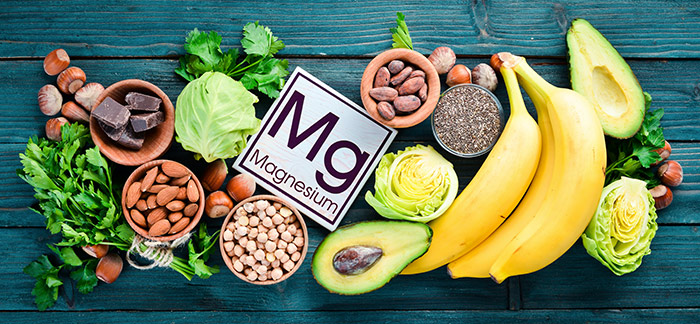|
Our magic ingredient this month is Magnesium. Magnesium is critical to hundreds of your body’s enzyme functions. Most people have heard it’s important, but how important is one of the most common elements on earth to human health? Here in a nutshell are the essential roles magnesium plays in the human body, and why it’s very important indeed to ensure a steady supply for an active lifestyle.
For those engaged in regular running, gym, or other sports, magnesium is critical to nerve and muscle functioning, blood pressure regulation and overall immunity. It’s very definitely an essential element, sports or not, one of a handful of microminerals science considers basic to building and maintaining a healthy human body. Magnesium is necessary to so many functions in the body, that deficiencies almost always show up on a host of fronts. This at least makes a deficiency easy to determine and treat.
|
|
Specific areas where magnesium aids our health:
|
 |
- Bones. We all know calcium is needed to keep bones strong, but right alongside it comes magnesium. A healthy intake shows improved bone crystal formation, a higher bone density, and for women, a lowered risk of osteoporosis after menopause.
- Hearts. For muscle maintenance, magnesium is essential. Deficiencies in sporting people are experienced as fatigue and cramping. Less obvious perhaps, is that the heart is a muscle too. An adequate supply of magnesium lowers the risk of cardiovascular problems and is essential for a healthy heart.
- Heads. There is growing evidence that stable magnesium levels help us avoid mood disorders, including anxiety and depression. Physiologically, the hypothalamic, pituitary and adrenal glands govern our reactions to stress, and magnesium is crucial for their healthy functioning.
|
|
Adult bodies contain around 25g of magnesium, which might not sound like a lot. By way of perspective, we often take zinc and iron supplements, yet science considers these to be micronutrients in comparison to magnesium.
|
|
Some of the worst results of magnesium deficiency manifest as:
|
 |
- Hastened diabetes. The research is still nuanced, but because of our bodies’ magnesium requirements in dealing with glucose and insulin metabolism, a deficiency clearly weakens the body’s resistance to developing diabetes.
- Migraines. Migraine sufferers typically have lower magnesium levels in their blood and tissues than others. Particularly magnesium citrate has been suggested as an essential front-line defence against succumbing to a debilitating migraine.
- PMS. Good news for the ladies is that premenstrual syndrome can often be alleviated by upping your magnesium. It won’t work for everyone, but it’s another basic defence worth trying, simply because it aids the body’s natural functioning, including its responses to pain. It’s best taken in conjunction with the Vitamin B complex for noticeable effects.
|
|
Magnesium can be found in leafy green vegetables like spinach, in almonds and peanuts, in cashew nuts, and pumpkin seeds too. Active quantities can be variable in modern green veggies, so either go big on greens or consult your physician to determine whether you’re getting an adequate dose often enough.
|
|
Highly soluble, people argue about the best kind of magnesium supplements. Broad consensus confirms that magnesium citrate is the form that is best absorbed by the body. Magnesium oxide is the least well absorbed, yet, has the highest magnesium content by weight. If you’ve tested as deficient, get a recommendation from the doctor. Magnesium can enhance or otherwise interact with some medicines, so it’s always good to glean a professional opinion before taking any supplements.
Magnesium really is a kind of magic ingredient for so many body functions, but active people especially should monitor their levels. It allows muscles to exert to their fullest and keeps the bones that support exertion strong and healthy.
|
|

